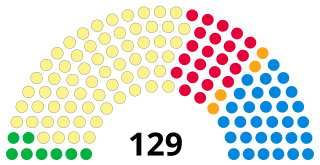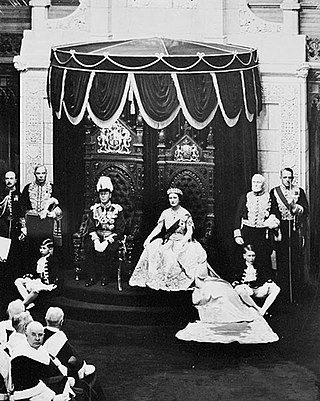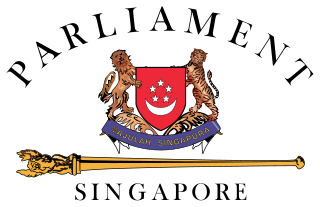
The Parliament of the United Kingdom of Great Britain and Northern Ireland is the supreme legislative body of the United Kingdom, and may also legislate for the Crown Dependencies and the British Overseas Territories. It meets at the Palace of Westminster in London. Parliament possesses legislative supremacy and thereby holds ultimate power over all other political bodies in the United Kingdom and the Overseas Territories. While Parliament is bicameral, it has three parts, consisting of the sovereign (King-in-Parliament), the House of Lords, and the House of Commons. In theory, power is officially vested in the King-in-Parliament. However, the Crown normally acts on the advice of the prime minister, and the powers of the House of Lords are limited to only delaying legislation; thus power is de facto vested in the House of Commons.

The Bill of Rights 1689 is an Act of the Parliament of England that set out certain basic civil rights and clarified who would be next to inherit the Crown. It remains a crucial statute in English constitutional law.

The Scottish Parliament is the devolved, unicameral legislature of Scotland. Located in the Holyrood area of the capital city, Edinburgh, it is frequently referred to by the metonym Holyrood. The Parliament is a democratically elected body comprising 129 members known as Members of the Scottish Parliament (MSPs), elected for five-year terms under the additional member system: 73 MSPs represent individual geographical constituencies elected by the plurality (first-past-the-post) system, while a further 56 are returned as list members from eight additional member regions. Each region elects seven party-list MSPs. Each region elects 15 to 17 MSPs in total. The most recent general election to the Parliament was held on 6 May 2021, with the Scottish National Party winning a plurality.

The Parliament of Canada is the federal legislature of Canada, seated at Parliament Hill in Ottawa, and is composed of three parts: the King, the Senate, and the House of Commons. By constitutional convention, the House of Commons is dominant, with the Senate rarely opposing its will. The Senate reviews legislation from a less partisan standpoint and may initiate certain bills. The monarch or his representative, normally the governor general, provides royal assent to make bills into law.
Acts of Parliament, sometimes referred to as primary legislation, are texts of law passed by the legislative body of a jurisdiction. In most countries with a parliamentary system of government, acts of parliament begin as a bill, which the legislature votes on. Depending on the structure of government, this text may then be subject to assent or approval from the executive branch.

Royal assent is the method by which a monarch formally approves an act of the legislature, either directly or through an official acting on the monarch's behalf. In some jurisdictions, royal assent is equivalent to promulgation, while in others that is a separate step. Under a modern constitutional monarchy, royal assent is considered little more than a formality. Even in nations such as the United Kingdom, Norway, the Netherlands, Liechtenstein and Monaco which still, in theory, permit their monarch to withhold assent to laws, the monarch almost never does so, except in a dire political emergency or on advice of government. While the power to veto by withholding royal assent was once exercised often by European monarchs, such an occurrence has been very rare since the eighteenth century.
The "cash-for-questions affair" was a political scandal of the 1990s in the United Kingdom.
Parliamentary privilege is a legal immunity enjoyed by members of certain legislatures, in which legislators are granted protection against civil or criminal liability for actions done or statements made in the course of their legislative duties. It is common in countries whose constitutions are based on the Westminster system.
A public inquiry, also known as a tribunal of inquiry, government inquiry, or simply inquiry, is an official review of events or actions ordered by a government body. In many common law countries, such as the United Kingdom, Ireland, Australia and Canada, such an inquiry differs from a royal commission in that a public inquiry accepts evidence and conducts its hearings in a more public forum and focuses on a more specific occurrence. Interested members of the public and organisations may make (written) evidential submissions, as is the case with most inquiries, and also listen to oral evidence given by other parties.

The Parliament of Victoria is the bicameral legislature of the Australian state of Victoria that follows a Westminster-derived parliamentary system. It consists of the King, represented by the Governor of Victoria, the Legislative Assembly and the Legislative Council. It has a fused executive drawn from members of both chambers. The parliament meets at Parliament House in the state capital Melbourne. The current Parliament was elected on 26 November 2022, sworn in on 20 December 2022 and is the 60th parliament in Victoria.

The Public Interest Disclosure Act 1998 (c.23) is an Act of the Parliament of the United Kingdom that protects whistleblowers from detrimental treatment by their employer. Influenced by various financial scandals and accidents, along with the report of the Committee on Standards in Public Life, the bill was introduced to Parliament by Richard Shepherd and given government support, on the condition that it become an amendment to the Employment Rights Act 1996. After receiving the Royal Assent on 2 July 1998, the Act came into force on 2 July 1999. It protects employees who make disclosures of certain types of information, including evidence of illegal activity or damage to the environment, from retribution from their employers, such as dismissal or being passed over for promotion. In cases where such retribution takes place the employee may bring a case before an employment tribunal, which can award compensation.

The Parliament of Singapore is the unicameral legislature of the Republic of Singapore, which governs the country alongside the president of Singapore. Largely based upon the Westminster system, the Parliament is made up of Members of Parliament (MPs) who are elected, as well as Non-constituency Members of Parliament (NCMPs) and Nominated Members of Parliament (NMPs) who are appointed. Following the 2020 general election, 93 MPs and two NCMPs from three political parties were elected to the 14th Parliament. Throughout the sitting of Parliament, nine NMPs are usually appointed by the president on a biennial basis.

The Inquiries Act 2005 is an Act of the Parliament of the United Kingdom. According to the explanatory notes, published by the Department for Constitutional Affairs, the Act "is intended to provide a comprehensive statutory framework for inquiries set up by Ministers to look into matters of public concern".
In countries with a parliamentary system of government, contempt of Parliament is the offence of obstructing the legislature in the carrying out of its functions, or of hindering any legislator in the performance of his duties.
In the UK and certain other Commonwealth countries, King's Consent is a parliamentary convention under which Crown consent is sought whenever a proposed parliamentary bill will affect the Crown's own prerogatives or interests. Prince's Consent is a similar doctrine, under which consent of the Prince of Wales must be obtained for matters relating to the Duchy of Cornwall. King's or Prince's Consent must be obtained early in the legislative process, generally before parliament may debate or vote on a bill. In modern times, following the tenets of constitutional monarchy, consent is granted or withheld as advised by government.

Parliamentary privilege in the United Kingdom is a legal immunity enjoyed by members of the House of Commons and House of Lords designed to ensure that parliamentarians are able to carry out their duties free from interference. The privileges are freedom of speech, freedom from arrest on civil matters, freedom of access to the sovereign, and that 'the most favourable construction should be placed on all the Houses' proceedings'. Fair and accurate reporting of the proceedings of parliament is also protected by parliamentary privilege.

The European Union (Withdrawal) Act 2018 is an Act of the Parliament of the United Kingdom that provides both for repeal of the European Communities Act 1972, and for parliamentary approval to be required for any withdrawal agreement negotiated between the Government of the United Kingdom and the European Union. The bill's passage through both Houses of Parliament was completed on 20 June 2018 and it became law by Royal Assent on 26 June.

The Dissolution and Calling of Parliament Act 2022 is an Act of the Parliament of the United Kingdom that repealed the Fixed-term Parliaments Act 2011 and reinstated the prior constitutional situation, by reviving the prerogative powers of the monarch to dissolve and summon parliament. As the monarch exercises this power at the request of the prime minister, this restored the power of the prime minister to have a general election called at a time of their choosing.

The Oaths Act, 1873, was a statute passed by the Parliament of Canada in 1873 which authorized any committee of the Senate or House of Commons to examine witnesses under oath.











